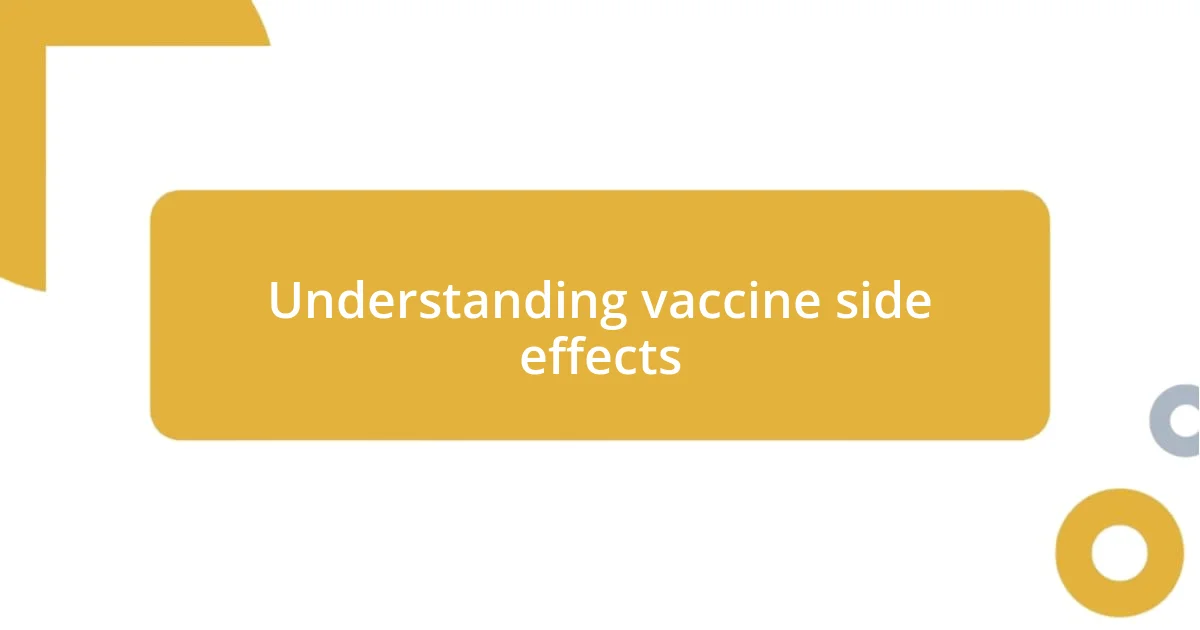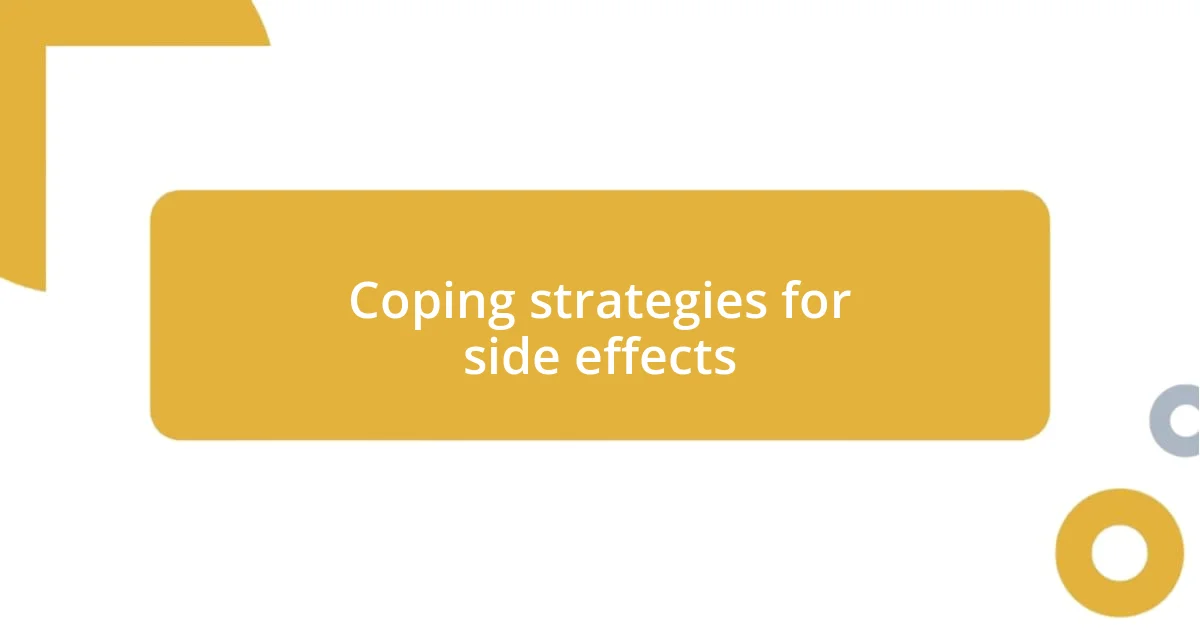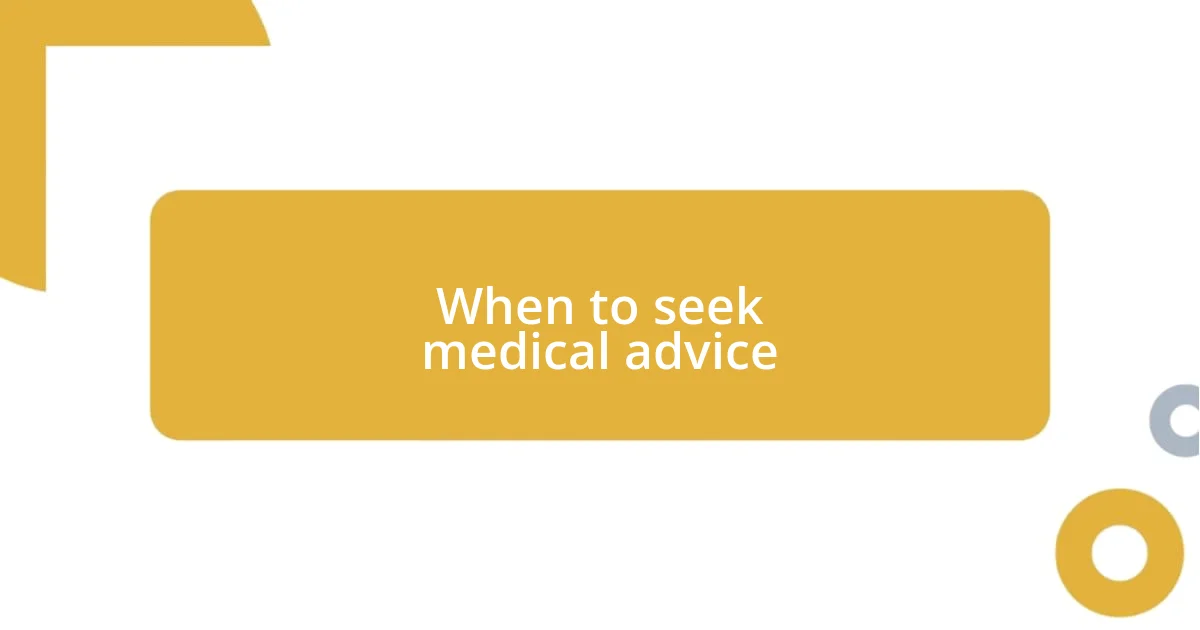Key takeaways:
- Common side effects of vaccines, like soreness, mild fever, and fatigue, are normal responses indicating that the immune system is working to build protection.
- It’s important to create a supportive environment and use coping strategies like hydration, distraction, and self-care to manage side effects effectively.
- Recognizing when to seek medical advice is crucial, particularly if side effects are severe, persistent, or include unusual symptoms, emphasizing the need to trust one’s instincts.

Understanding vaccine side effects
When I received my first dose of a vaccine, I remember feeling a mix of anticipation and nervousness about potential side effects. I was surprised to discover that many of the reactions, like a sore arm or mild fever, are actually normal and indicate that the vaccine is working to build immunity. It made me reflect: how often do we fear the unknown when, in reality, our bodies are just processing necessary changes?
After my second shot, I experienced a day of fatigue that left me lounging on the couch. While it felt uncomfortable, I had to remind myself that this discomfort was temporary and meant my immune system was gearing up to fight off what it could encounter in the future. Have you ever experienced a moment where you felt something was tough yet understood it was for your benefit? I’ve learned to embrace those fleeting side effects as my body’s way of prepping for a stronger defense.
Sometimes, it helps to talk openly about these feelings. When I discussed my experience with friends, I realized many of them had similar stories of mild side effects that they initially found alarming. It made me think, why don’t we share these stories more often? By normalizing these reactions, we can alleviate fears and foster a supportive environment around vaccinations, making it an experience we can navigate together.

Common side effects experienced
When discussing common side effects after vaccination, most people might recall soreness at the injection site as one of the first things they notice. I certainly did. It felt like the aftermath of an intense workout—my arm was tender, reminding me of where the magic was happening beneath the surface. For many, this discomfort is fleeting, but it’s a powerful reminder that our bodies are responding in a positive way.
Another side effect I frequently hear about is mild fever, which can be unsettling. The night after my last shot, I felt a slight chill followed by warmth—kind of like being wrapped in a warm blanket on a cold night. It’s fascinating how our bodies sometimes react in ways that feel alarming yet are necessary for our overall health. This moment taught me to appreciate bodily sensations that signal change, even if they are uncomfortable.
While fatigue is something we always dread, I learned its importance through my own experience. After my vaccinations, I felt completely drained, like I had run a marathon while sitting still. Initially, I was frustrated, but I soon realized that this fatigue was my body’s way of conserving energy to build immunity. Reflecting on these moments helps me embrace side effects not as nuisances, but as signals of my body actively preparing to keep me safe.
| Side Effect | Description |
|---|---|
| Sore Arm | A localized sensation of discomfort or tenderness after the injection. |
| Mild Fever | A temporary increase in body temperature as part of the immune response. |
| Fatigue | A feeling of tiredness, often as a sign of the body’s energy being directed toward immunity building. |

My personal experience details
After my vaccination experience, I vividly remember waking up the next morning feeling a strange sense of heaviness in my limbs. It was that kind of tiredness where you want to just curl up and close your eyes. I decided to take a day off from my usual routine. I sunk into my couch with a good book and allowed myself to embrace the fatigue, turning what could have been a frustrating situation into a cozy day of self-care.
- The fatigue felt unusual yet rewarding.
- Each time I could feel my body working, I couldn’t help but smile a bit, despite the discomfort.
- I treated myself to homemade soup, a comforting meal that felt like a hug in a bowl, symbolizing warmth and healing.
By creating space for myself during those moments of tiredness, I realized that my body was doing exactly what it needed to. It made me reflect on how a little patience and understanding can go a long way in transforming discomfort into an opportunity for connection with my own well-being.

Duration of side effects
The duration of side effects can vary significantly from person to person. For me, the soreness in my arm lasted only about a day, but I know others who experienced discomfort for a couple of days. Isn’t it fascinating how our bodies react differently? I think it highlights the uniqueness of each immune response, which can feel encouraging in its own right.
When it comes to mild fever, I noticed my temperature returned to normal within 24 hours. I remember checking my thermometer and feeling relieved. It’s a reminder that while those moments of discomfort can feel alarming, they are often temporary. Just like a storm that passes, the fever was short-lived, leaving me with a sense of accomplishment once it was over.
Fatigue was a different story; I felt it lingering for a bit longer. On the second day, I still wanted to take naps, and I couldn’t help but wonder if this was my body’s way of telling me to slow down. After my experience, I learned to listen closely to these signals. Recognizing that these side effects, however inconvenient, often serve a purpose makes enduring them feel more manageable. Don’t you think we could all benefit from a little self-awareness during these times?

Coping strategies for side effects
When I found myself grappling with side effects, I discovered that setting up a comforting environment made a world of difference. I lit some candles, played soothing music, and wrapped myself in a soft blanket. It’s amazing how these small adjustments can create a sense of peace amidst discomfort. Have you ever noticed how a cozy atmosphere can lighten your mood, even when you’re feeling under the weather?
Staying hydrated was another crucial strategy for me. I made it a point to drink plenty of fluids, especially herbal teas and water. I remember one afternoon, sipping on ginger tea while curling up on my couch, and it felt as if each warm sip was both soothing my throat and comforting my spirit. It’s incredible how something as simple as hydration can help ease certain symptoms, allowing your body to recover more smoothly.
I also learned the value of distraction. Watching lighthearted shows or catching up on my favorite podcasts helped keep my mind off the fatigue. I recall one evening where I found myself chuckling at a comedy series, forgetting for a moment about the heaviness in my limbs. Isn’t it interesting how laughter can be an excellent medicine? Engaging in activities that brought me joy made the side effects feel less prominent, turning an uncomfortable experience into a time of mental refreshment.

When to seek medical advice
Recognizing when to seek medical advice after vaccination can be a bit tricky. If you notice that your side effects are not improving – let’s say a persistent high fever over 101°F or severe headache that doesn’t respond to over-the-counter medication – it’s definitely time to reach out to a healthcare professional. I remember feeling a wave of anxiety when my friend experienced adverse reactions that extended beyond the usual. It reinforced how important it is to trust your instincts.
It’s also essential to stay alert for any uncommon symptoms that may arise, like sudden swelling at the injection site or difficulty breathing. I once read about someone who dismissed a rash on their arm, only to find out it was an allergic reaction that required immediate attention. It serves as a stark reminder that our bodies can communicate warning signals – and it’s our responsibility to listen.
Lastly, if you’re ever unsure about your symptoms, don’t hesitate to call a doctor or nurse. I had a moment when I felt overwhelmed by the side effects and their unpredictability, yet a phone call to my healthcare provider clarified my concerns. Isn’t it reassuring to know that medical professionals are just a call away? Seeking their advice not only helps address immediate worries but can also provide peace of mind.

Resources for further information
For those looking to dive deeper into vaccine side effects, several reputable sources are invaluable. The Centers for Disease Control and Prevention (CDC) offers comprehensive and updated information on vaccine safety and potential side effects. I remember browsing their site after my vaccination; it was comforting to see clear guidelines and statistics that eased my concerns.
Another great resource is the World Health Organization (WHO), which provides global perspectives and research findings on vaccines. Their focus on evidence-based information helped me understand the broader context of vaccine side effects. Isn’t it reassuring to have access to scientifically backed data when navigating such personal health experiences?
Lastly, local health departments can serve as a valuable touchpoint. They often host informational sessions or webinars, and I benefited immensely from one that detailed the common side effects I might encounter. Engaging with these resources not only informed my approach but also empowered me to advocate for my own health. Have you ever felt that empowerment when you uncover knowledge?














